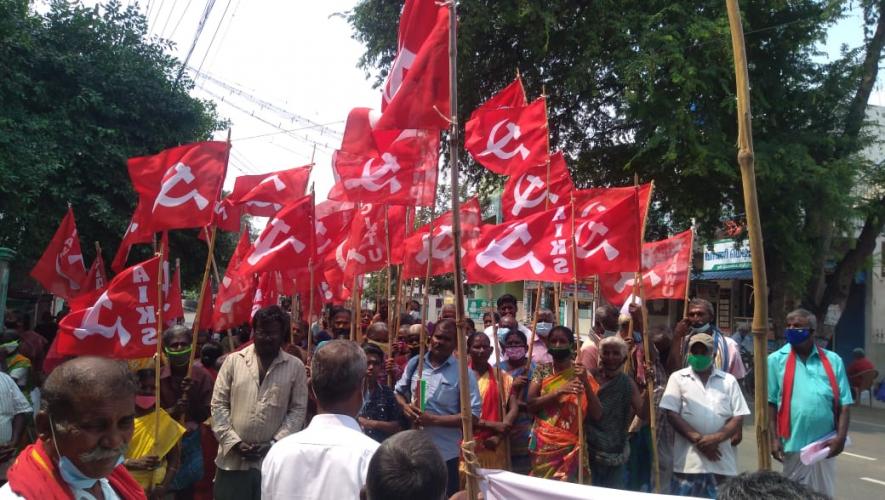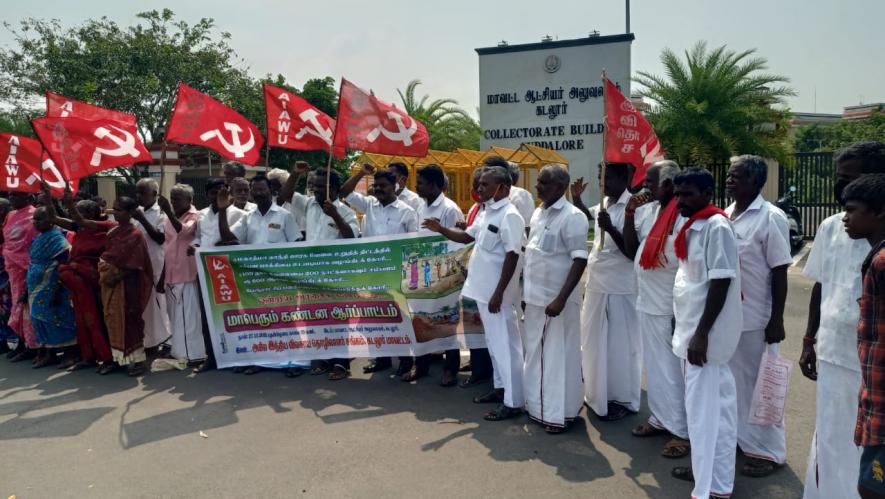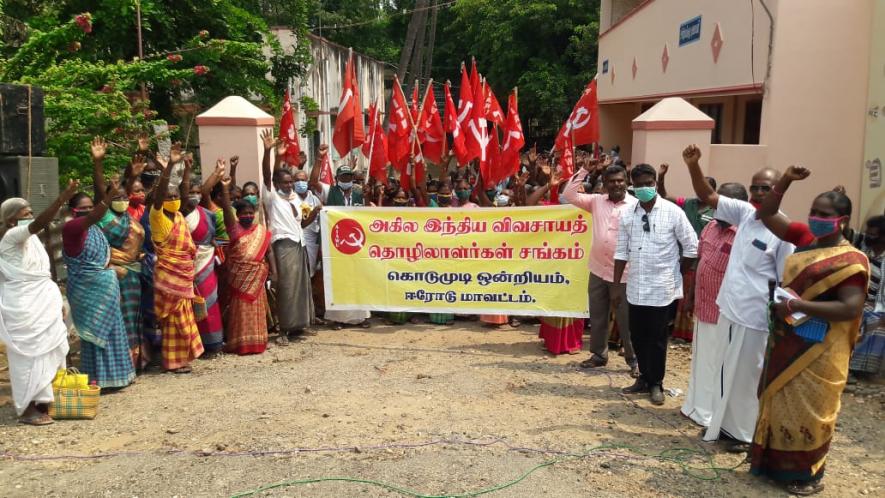Dull Diwali for MGNREGA Workers in Tamil Nadu

MNREGA workers protest the delay in wage payment.
It was a dull Diwali for Mahatma Gandhi National Rural Employment Guarantee Act (MGNREGA) workers in Tamil Nadu with the payment of their pending wages a day after the festival was over. The Centre, which has allegedly withheld their wages for six to seven weeks, snatching away the sheen of the festival.
The All India Agricultural Workers Union (AIAWU) led a massive protest on October 27 across the state seeking immediate payment of wages. Chief minister MK Stalin shot off a letter to Prime Minister Narendra Modi seeking funds for wages. The increasing dependence on MNREGA is a sign of the poor economic conditions in the rural areas and calls for strengthening the scheme rather than diluting it, as the Union government has been doing, the AIAWU said.
LIFELINE FOR RURAL POOR
The MNREGA, a brainchild of the left parties, was implemented during the first rule of the United Progressive Alliance (UPA) government in 2005. Aimed at providing a minimum of 100 days of work to rural households, the project continues to be a lifeline for lakhs.
In Tamil Nadu, 134.16 lakh workers have registered under the scheme with 92.36 lakh job cards issued in 12,525 village panchayats of 388 blocks. The number of active job cards were 75.13 lakh with 92.68 lakh active workers on November 6, Saturday. Of the active workers, scheduled caste (SC) and scheduled tribe (ST) form 29.91% and 1.69% respectively.
In 2020-21, 2,190.81 lakh person days were achieved out of the 2,500 person days allocated, of which women and SC person days were 84.99% and 29.81% respectively. The average number of days per year per household has remained below 50 in the last five financial years except 2020-21, which had 50.22 days. For 2021-22, work has been given for 34.41 days per household so far.
DELAYED WAGE PAYMENT AFFECTS DEPENDENTS
A total 63.66 lakh households have worked and 73.82 lakh individuals worked at an average wage of Rs 209.63 in the current financial year so far. “The workers are not getting anywhere close to 100 days of work and are paid much lower than the officially announced daily wage of Rs 273,” S Sankar, state treasurer, AIAWU, told Newsclick.

Workers demonstrate against the delay in wage payment in Cuddalore district.
“The Union government has been delaying the payment of wages frequently, which impacted the workers on Diwali. The Centre must ensure that all eligible households are provided 100 days work and the legal wage,” Sankar added.
In a letter addressed to Modi, K Balakrishnan, state secretary, Communist Party of India (Marxist), alleged that the Centre has reduced the MGNREGA funds. “The Bharatiya Janata Party government has been continuously weakening MGNREGA and reducing the allocation of funds, waging an economic war against the rural poor of the country,” he wrote, condemning the delay in releasing wages amounting to Rs 2,137 crore to Tamil Nadu workers. After the protest and the letters written by Stalin and Balakrishnan, the Centre sanctioned Rs 1,361.5 crore for clearing the pending dues.
REGULATE AND STRENGTHEN WORKS
Certain political parties from the state, including Naam Tamilar Katchi (NTK), have demanded the scrapping of MGNREGA. But the increase in the number of dependents and beneficiaries of the scheme shows the poor status of the economy, implying the need to strengthen it.
“The COVID-19 pandemic has taken a heavy toll on the economy. Mostly, the rural population depending on daily wages are affected. The Union government must strengthen MGNREGA and ensure 100 days of work and wages,” said NS Kannan, Kanyakumari district unit president, AIAWU.

Workers protest in Kodumudi taluk, in Erode district.
Kannan brushed aside the allegation that poor work culture among the workers led to the delay in the completion of works. The state has a work completion rate of 89.19% since 2018-19.
“We have to regulate the works by engaging more overseers in the scheme. One supervisor is in charge of five to seven village panchayats, which makes monitoring impossible. Moreover, the administrative hiccups and malpractices must be checked to retain the rights of the workers.”
The 134.16 lakh workers registered with MGNREGA constitute almost 20% of the state population. “A high percentage of the state population is registered with MNREGA. The increasing participation of women in the scheme points to the shrinking income of families and more dependence on MGNREGA. To protect the rural people and their economic status, the Union government must strengthen the scheme,” Sankar demanded.
The union has demanded that the state government engage the differently abled in maintaining muster rolls instead of forcing them to carry out physical works. “Each worker is given 32 cubic feet of work per day, which is not possible for normal workers. The differently abled must be given work related to documentation in the scheme,” Sankar added. A total of 68,326 differently abled persons in the state have worked so far in 2021-22.
CASTEWISE SEGREGATION ON HOLD
When the ministry of rural development issued an advisory to divide the MNREGA payment system based on caste in March, the AIAWU and CPI(M) resisted the move and termed it divisive. “We suspected that not only payment but work allocation would also be done based on caste. It would have led to the exploitation of SC and ST workers. The AIAWU had protested the move in the past several months, leading to the suspension of the proposal,” Kannan told Newsclick.
Get the latest reports & analysis with people's perspective on Protests, movements & deep analytical videos, discussions of the current affairs in your Telegram app. Subscribe to NewsClick's Telegram channel & get Real-Time updates on stories, as they get published on our website.























